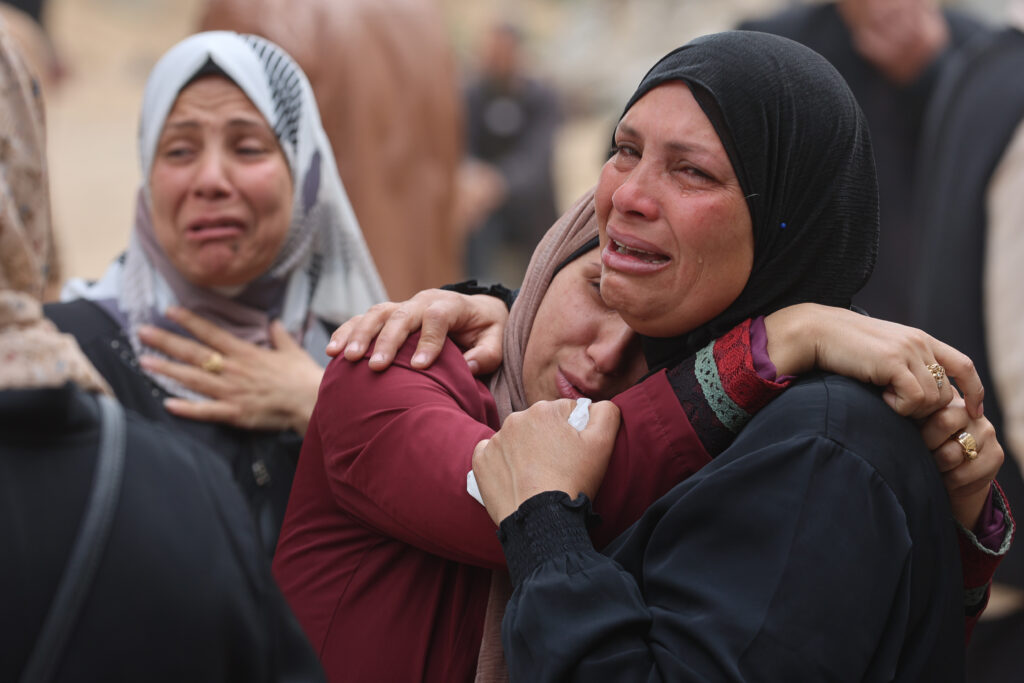Palestinian president Mahmud Abbas on Wednesday urged Hamas to free all hostages in Gaza, saying their captivity provided Israel with “excuses” to attack the territory, as rescuers recovered charred bodies from an Israeli strike.At least 18 people were killed across the Gaza Strip by Israeli strikes, while Germany, France and Britain urged Israel to end its blockade on aid entering the besieged territory.Israel resumed its military campaign in Gaza on March 18, bringing an end to the ceasefire that had largely paused hostilities and resulted in the release of 33 hostages from Gaza and approximately 1,800 Palestinian prisoners from Israeli jails.Talks aimed at reaching a new ceasefire have so far failed to produce any breakthroughs, and a Hamas delegation is currently in Cairo for renewed negotiations with Egyptian and Qatari mediators.”Hamas has given the criminal occupation excuses to commit its crimes in the Gaza Strip, the most prominent being the holding of hostages,” Abbas said at a meeting in Ramallah, the seat of the Palestinian Authority (PA) in the Israeli-occupied West Bank.”I’m the one paying the price, our people are paying the price, not Israel. My brother, just hand them over.”Ties between Abbas’ Fatah party and Hamas have been tense, with deep political and ideological divisions for nearly two decades.Abbas and the PA have often accused Hamas of undermining Palestinian unity, while Hamas has criticised the former for collaborating with Israel and cracking down on dissent in the West Bank.- ‘Charred bodies’ -Israel continued to pound Gaza on Wednesday, with rescuers saying at least 18 people had been killed since dawn, including 11 in a strike on a school-turned-shelter for displaced people.”The school was housing displaced people. The bombing sparked a massive blaze, and several charred bodies have since been recovered,” he said, describing the attack on Yaffa school in Al-Tuffa neighbourhood of Gaza City.Several bodies, wrapped in white shrouds, were laid at the morgue of Al-Shifa hospital, an AFP journalist reported.At the hospital, women were seen weeping over the body of a child wrapped in a white shroud.Grieving relatives carried the bodies of their loved ones for burial, including those of children.”We want nothing more than for the war to end, so we can live like people in the rest of the world,” said Walid al-Najjar, a resident of Khan Yunis.”We are a people who are poor, devastated — our lives are lost.”- ‘No tools’ to retrieve bodies -Since the war began following Hamas’s October 7, 2023, attack on Israel, tens of thousands of displaced Gazans have sought refuge in schools to escape the violence.Aid agencies estimate that the vast majority of Gaza’s 2.4 million residents have been displaced at least once since the war began.”We lack the necessary tools and equipment to carry out effective rescue operations or recover the bodies of martyrs,” Bassal said.On Tuesday, the Israeli military stated that it had targeted approximately 40 “engineering vehicles”, alleging they were being used for “terror purposes”. Elsewhere in Gaza, additional fatalities were reported on Wednesday, including four people killed in Israeli shelling of homes in eastern Gaza City, according to Bassal.The Israeli military did not immediately comment on the latest strikes.Since Israel’s military campaign resumed, at least 1,928 people have been killed in Gaza, bringing the total death toll since the war erupted to at least 51,305, according to the health ministry in Hamas-run Gaza.Hamas’s attack on Israel in 2023 that ignited the war resulted in the deaths of 1,218 people on the Israeli side, mostly civilians, according to an AFP tally based on official Israeli figures.Germany, France, and Britain on Wednesday called on Israel to stop blocking humanitarian aid into Gaza, warning of “an acute risk of starvation, epidemic disease and death”.”We urge Israel to immediately restart a rapid and unimpeded flow of humanitarian aid to Gaza in order to meet the needs of all civilians,” their foreign ministers said in a joint statement.The UN also warned that many community kitchens that are providing food for displaced people are also shutting due to depleting stocks.


